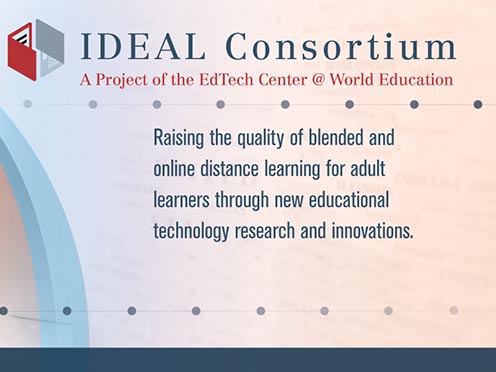RESOURCES
When the IDEAL Consortium was know as Project IDEAL, the Support Center at University of Michigan developed a series of papers that address assessment and reporting issues, state and national policy, professional development and curriculum selection.
Exploring Distance Education Curricula for Adult Learners (2005)
Addresses key issues and provides guidelines for states to consider in selecting and utilizing distance curricula.
Measuring Contact Hours and Educational Progress in Distance Education Programs (2005)
Identifies three methods for counting contact hours for distance students, providing outcome results for distance experiments conducted between 2003 and 2005.
State Policy for Distance Education Programs for Adult Learners (2005)
Follows up on issues identified in Exploring Policy Issues and Options in Distance Education for Adult Learners and presents key questions states need to consider as they address policy issues. Includes sample policies developed by consortium member states.
Beyond the Classroom: Six States Develop Distance Programs for Adult Learners (2004)
Case studies of the efforts of six Project IDEAL states to develop and sustain tailored distance education programs suggest ways in which distance education can be used to serve adult learners. Addresses themes that cut across states and policy questions.
A Pilot Test of Study Groups: Professional Development for Experienced Distance Teachers (2004)
Reports on Project IDEAL’s pilot test of an online professional development model in which experienced distance educators develop and review case studies of challenging pedagogical issues.
Exploring Policy Issues and Options in Distance Education for Adult Learners (2004)
Reports on interviews with five state directors who have established distance education programs regarding their experiences developing, maintaining and expanding distance education in their states. Includes state directors’ recommendations for areas in which state and federal policies need to be developed.
Using Assessment to Guide Instructional Planning for Distance Learners (2004)
Explores different efforts to develop and test measures of educational progress and outcome. Approaches include using checklists and portfolios as well as online quizzes.
Assessment and Accountability Issues in Distance Education for Adult Learners (2002)
Focuses on the role of assessment in distance education, recommending research activities to address methods for tracking distance student progress and outcomes.

